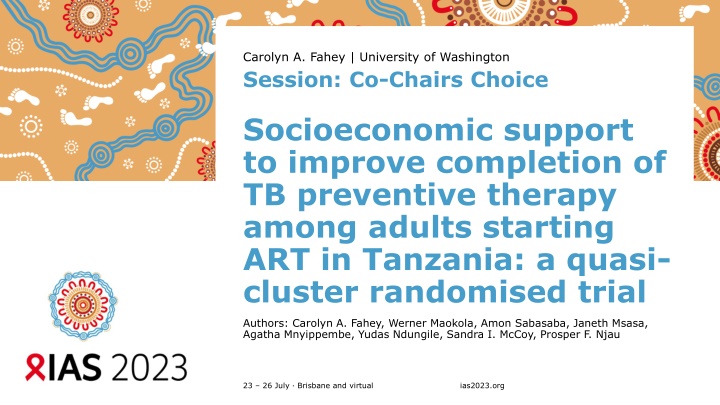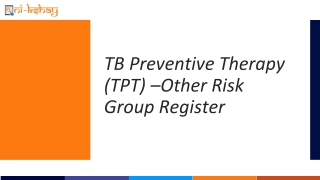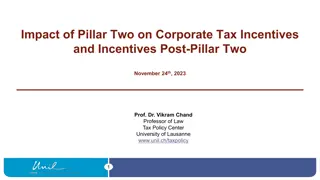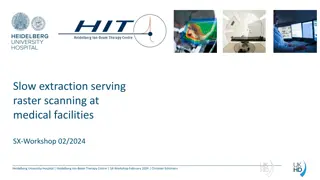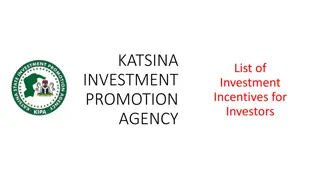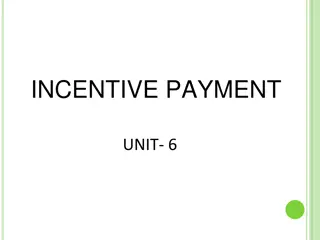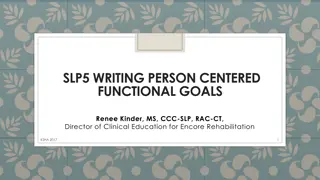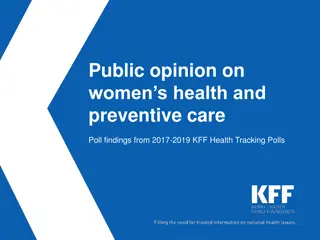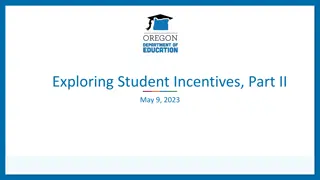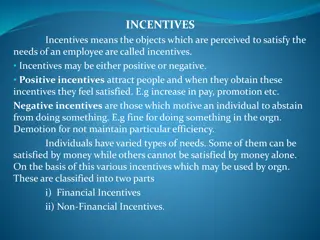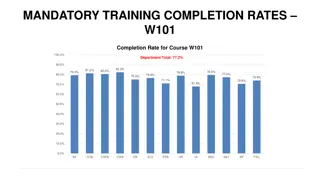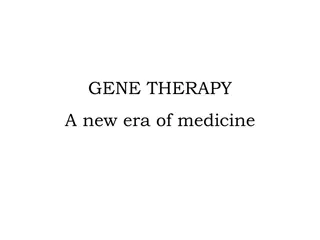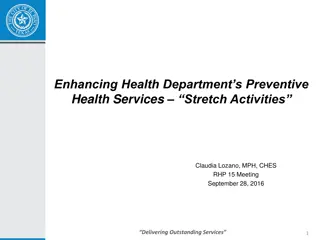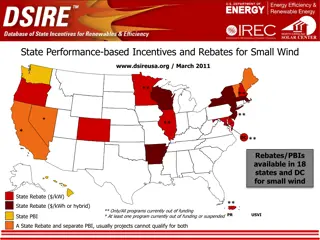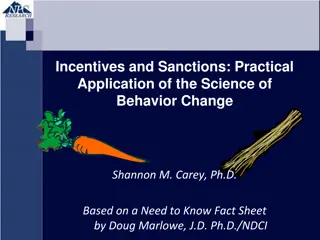Enhancing Completion of TB Preventive Therapy with Financial Incentives
Study in Tanzania shows that financial incentives and targeted peer counseling increase completion of isoniazid preventive therapy among ART initiates. Providing short-term socioeconomic support benefits TB prevention efforts and improves outcomes for individuals with HIV. Effective strategies may include cash incentives and supportive interventions for at-risk clients.
Download Presentation

Please find below an Image/Link to download the presentation.
The content on the website is provided AS IS for your information and personal use only. It may not be sold, licensed, or shared on other websites without obtaining consent from the author.If you encounter any issues during the download, it is possible that the publisher has removed the file from their server.
You are allowed to download the files provided on this website for personal or commercial use, subject to the condition that they are used lawfully. All files are the property of their respective owners.
The content on the website is provided AS IS for your information and personal use only. It may not be sold, licensed, or shared on other websites without obtaining consent from the author.
E N D
Presentation Transcript
Carolyn A. Fahey | University of Washington Session: Co-Chairs Choice Socioeconomic support to improve completion of TB preventive therapy among adults starting ART in Tanzania: a quasi- cluster randomised trial Authors: Carolyn A. Fahey, Werner Maokola, Amon Sabasaba, Janeth Msasa, Agatha Mnyippembe, Yudas Ndungile, Sandra I. McCoy, Prosper F. Njau 23 26 July Brisbane and virtual ias2023.org
Summary Question What is the effect of financial incentives plus targeted peer counseling on completion of isoniazid preventive therapy (IPT) for tuberculosis (TB)? Findings At 6 months after starting ART, a greater proportion of the intervention group had received a full course of IPT compared to a control group. Importance These findings strengthen the case for providing short-term socioeconomic support to ART initiates, with potential benefit for TB prevention efforts. 23 26 July Brisbane and virtual ias2023.org
Preventive treatment for tuberculosis TB disease is a leading cause of death among people living with HIV globally. Tanzania High burden of TB/HIV Untreated latent TB infection is more likely to advance to TB disease in people living with HIV. 1 in 3 TB diagnoses occur among people living with HIV WHO recommends TB preventive treatment for clients starting ART in high TB areas; typically 6 months of daily isoniazid. Uptake and completion of IPT has been low, including in Tanzania. 23 26 July Brisbane and virtual ias2023.org
Financial incentives reduce loss to follow-up when offered at ART start High LTFU in first 6 months of ART Incentives improve retention & ART adherence While effective, 10% of incentive recipients still LTFU at 6 months. Additional support needed for clients at highest risk. Cash plus interventions combine cash transfers with complementary strategies (WHO, 2017). IPT dispensing period Kalinjuma et al., JAIDS (2020) Fahey et al., The Lancet HIV (2020) 23 26 July Brisbane and virtual ias2023.org
Predicting risk of LTFU for incentive recipients Developed a brief screening tool based on model-selected risk factors at ART start*: 1. Self-rated health 2. Depressive symptom 3. Educational attainment 4. Labor force participation Optimal score cut-off Related work from our team Fahey et al. (2022). Machine learning with routine medical record data to identify people at high risk of disengagement from HIV care in Tanzania. PLOS Global Public Health. EPE0982: Prediction of disengagement from HIV care using routinely collected medical record data and machine learning. *Analysis of 346 incentive recipients from Fahey et al., The Lancet HIV (2020) 23 26 July Brisbane and virtual ias2023.org
Incentives+ to Prevent Tuberculosis (IPT) study Packel et al., Trials (2020) / NIH R01MH112432 (McCoy) in progress Lake Zone, Tanzania IRB approvals Tanzania National Institute for Medical Research University of California Berkeley CPHS Targeted peer counselling 23 26 July Brisbane and virtual ias2023.org
Inclusion criteria for facilities and participants Health facilities Health care seekers 65 new ART initiates per quarter 100 km from a major city 15 km from another study clinic Willingness to implement mHealth system 18 years of age Living with HIV Started ART 30 days ago Access to a mobile phone Plan to attend same clinic for 12 months Written informed consent 23 26 July Brisbane and virtual ias2023.org
Interventions delivered using mHealth technology Enrolment: Linkage with home-based care provider (HBC) if higher risk score Monthly for 6 months: Digital financial incentives (22,500 TZS, ~ $10 USD) Implemented in pharmacy during dispensing. Packel et al., Implementation Science Communications (2021) 23 26 July Brisbane and virtual ias2023.org
Interventions delivered using mHealth technology ALL sites Every visit: Real-time dispensing & appointment data entered in pharmacy After a missed appointment: Notification and tracking system 23 26 July Brisbane and virtual ias2023.org
Participant characteristics at baseline Control group (n=928) Intervention group (n=90) Total (n=1018) Facility-level characteristics Facility type Dispensary 264 (25.9%) 243 (26.2%) 21 (23.3%) Health centre 562 (55.2%) 493 (53.1%) 69 (76.7%) Hospital 192 (18.9%) 192 (20.7%) 0 (0%) Average quarterly ART initiates, mean (SD) 132 (75.7) 136 (77.8) 87 (17.5) Distance to city (km), mean (SD) 44 (25.9) 45.0 (26.2) 33.6 (21.1) Individual-level characteristics Female 587 (57.7%) 532 (57.3%) 55 (61.1%) Age (years), mean (SD) 37.1 (11.7) 37.0 (11.6) 38.7 (11.8) WHO Clinical Stage 1 or 2 927 (92.1%) 846 (92.2%) 81 (91.0%) 23 26 July Brisbane and virtual ias2023.org
Outcomes at 6 months Dispensed 6 months of isoniazid Intervention delivery 100% 85 (94%) received at least one cash transfer (mean: 5.2) 40 (44%) with higher predicted LTFU risk were also paired with a HBC for additional adherence counseling Risk difference: 16.0 (95% CI: 2.3, 29.7) 90% 80% 70% Participants (%) 60% 50% Related work from our team 40% 67% McCoy et al. (2017). Cash vs. food assistance to improve adherence to ART among adults living with HIV in Tanzania. AIDS. 30% 51% 20% Fahey et al. (2020). Financial incentives to promote retention in care and viral suppression in adults initiating ART in Tanzania: a three-arm randomised controlled trial. The Lancet HIV. 10% 0% H mono et al. (2023). Financial incentives to improve re- engagement in HIV care: a randomized pilot study. AIDS Care. Control group Intervention group Estimates from regression models adjusted for facility-level variables used in constrained randomisation process 23 26 July Brisbane and virtual ias2023.org
Limitations and future directions Quasi-cluster randomised design Small sample size in intervention group Multiple interventions, cannot isolate impact of each While improved over control, still low IPT completion New 3-month TB preventive treatment Economic/social support potentially even more beneficial Additional research on effectiveness and implementation of combination strategies to bolster retention and adherence within TB/HIV care 23 26 July Brisbane and virtual ias2023.org
Acknowledgements UC Berkeley Dr. Sandra McCoy Dr. Laura Packel Solis Winters Dr. William Dow Dr. Nicholas Jewell Rasello Joan Mneney Elizabeth Mzobora Debindra Katwal Puspa Bhattarai Natalino Mwenda Ministry of Health Dr. Werner Maokola Dr. Prosper Njau Dr. Ntuli Kapologwe NACP, TACAIDS, PO-RALG Shinyanga RMO and RHMT Dr. Yudas Ndungile Dr. Rashid Mfaume CTC staff Health for a Prosperous Nation (HPON) Dr. Amon Sabasaba Dr. Emmanuel Katabaro Janeth Msasa Agatha Mnyippembe Kassim Hassan Afya II study staff Financial Support CEGA EASST NIH/NIMH R01MH112432
Thank you! 23 26 July Brisbane and virtual ias2023.org
